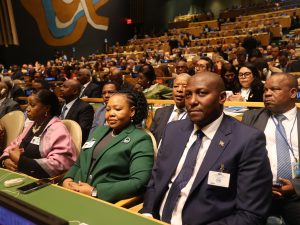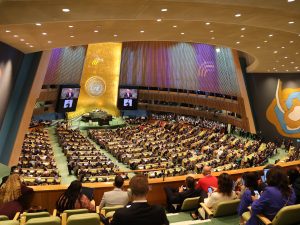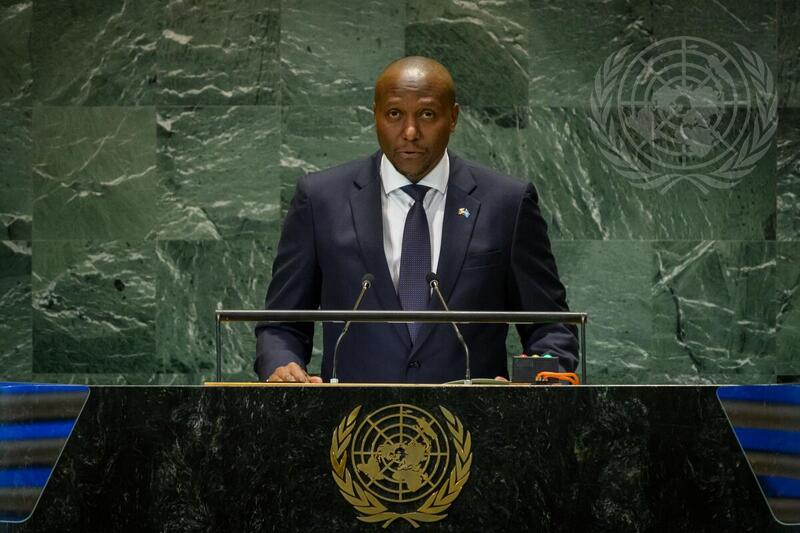By Staff Reporter
THE United Nations General Assembly (UNGA) opened on Tuesday with UN Secretary-General António Guterres telling delegates at the 79th session in New York that ‘Our world is in a whirlwind. We are in an era of epic transformation — facing challenges unlike any we have ever seen — challenges that demand global solutions.’
Among the delegates in attendance was Prime Minister Russell Dlamini who is representing His Majesty King Mswati III.
The theme for this year is ‘Leaving no one behind: Acting together for the advancement of peace, sustainable development & Human Dignity for present & future Generations.’
The Prime Minister is expected to present a country statement on behalf of His Majesty King Mswati III on Friday.
RELATED: Prime Minister calls for inclusion of Taiwan in international system
He is also expected to make interventions at a high-level side event hosted by UNAIDS themed: ‘Revitalised Multilateralism: Recommitting to Ending AIDS Together’ this evening.
On Monday, the Prime Minister in his address made a passionate call for comprehensive debt restructuring and reforms to international institutions like the International Monetary Fund (IMF) and World Bank.
The premier said the debt restructuring and reforms will ensure that financial institutions like the IMF and World Bank can respond to the needs of the developing nations. He said this will also ensure fairer access to financing for climate resilience and development.
“It is a great honour to address the Summit of the Future on behalf of His Majesty King Mswati III, where world leaders have gathered to commit to ‘Multilateral Solutions for a Better Tomorrow’.
This Summit is an opportunity to take bold actions that will shape the future of our planet and the well-being of generations to come.
We commend the co-facilitators of the outcome documents – the Pact of Future, Global Digital Compact, and Pact on Future Generations – for their stellar work,” the PM said.
In his address during the opening, Guterres said geopolitical divisions keep deepening and the planet keeps heating. He added that wars rage with no clue how they will end.

“And nuclear posturing and new weapons cast a dark shadow. We are edging towards the unimaginable — a powder keg that risks engulfing the world. Meanwhile, 2024 is the year that half of humanity goes to the polls — and all of humanity will be affected,” he said.
“I stand before you in this whirlwind convinced of two overriding truths. First, the state of our world is unsustainable.
We can’t go on like this. And second, the challenges we face are solvable. But that requires us to make sure the mechanisms of international problem-solving actually solve problems.”
Guterres maintained that the Summit of the Future was a first step, but we have a long way to go. He added that getting there requires confronting three major drivers of unsustainability.
“A world of impunity — where violations and abuses threaten the very foundation of international law and the UN Charter. A world of inequality — where injustices and grievances threaten to undermine countries or even push them over the edge. And a world of uncertainty — where unmanaged global risks threaten our future in unknowable ways. These worlds of impunity, inequality and uncertainty are connected and colliding,” he said.
Guterres spoke about the current conflict between Israel and Hamas in the Middle East, saying the level of impunity in the world is politically indefensible and morally intolerable.
RELATED: Japan’s Prime Minister Kishida to resign, paving way for new leader
“Today, a growing number of Governments and others feel entitled to a ‘get out of jail free’ card. They can trample international law.
They can violate the United Nations Charter. They can turn a blind eye to international human rights conventions or the decisions of international courts.
They can thumb their nose at international humanitarian law. They can invade another country, lay waste to whole societies, or utterly disregard the welfare of their own people.
And nothing will happen. We see this age of impunity everywhere — in the Middle East, in the heart of Europe, in the Horn of Africa, and beyond,” he said.
Guterres said the war in Ukraine is spreading with no signs of letting up and civilians are paying the price — in rising death tolls and shattered lives and communities. He said it was time for a just peace based on the UN Charter, international law, and UN resolutions.
“From Myanmar to the Democratic Republic of the Congo to Haiti to Yemen and beyond, we continue to see appalling levels of violence and human suffering in the face of a chronic failure to find solutions. Meanwhile, our peacekeeping missions are too often operating in areas where there is simply no peace to keep,” he said.
Guterres added that instability in many places around the world is a by-product of instability in power relations and geopolitical divides. He also added that rising inequalities are a second driver of unsustainability and a stain on our collective conscience.

According to the Secretary-General, inequality is not a technical or bureaucratic issue. At its heart, inequality is a question of power with historic roots and conflict, climate upheaval and the cost-of-living crisis are pushing those roots deeper, he said.
“At the same time, the world has not recovered from the surge in inequalities caused by the pandemic. Of the world’s poorest 75 countries, one-third are worse off today than they were five years ago.
During that same period, the five richest men in the world have more than doubled their wealth. And the top 1 per cent of people on earth own 43 per cent of all global financial assets,” Guterres said.
He added that the third driver of our unsustainable world is uncertainty. Guterres said ‘the ground is shifting under our feet’ and anxiety levels are off the charts. And young people, in particular, are counting on them and seeking solutions.
“Uncertainty is compounded by two existential threats — the climate crisis and the rapid advance of technology — in particular, artificial intelligence (AI). We are in a climate meltdown.
Extreme temperatures, raging fires, droughts, and epic floods are not natural disasters. They are human disasters — increasingly fuelled by fossil fuels,” he said.


